Laptop Mag Verdict
The PowerSpec 1510 is one heck of a deal, getting you a vibrant display, great port selection and a GTX 1070 GPU, all for just $1,300.
Pros
- +
Great price on a GTX 1070 GPU
- +
Tons of ports
- +
Strong performance
- +
Vibrant display
Cons
- -
Quiet audio
- -
No helpful gaming utilities
- -
Warm temps while gaming
Why you can trust Laptop Mag
Seemingly great laptop deals usually come with a catch , but with the PowerSpec 1510, I couldn't find one. The laptop has an Intel Core i7-7700HQ CPU and an Nvidia GeForce GTX 1070 GPU for just $1,299.99 (and only available at MicroCenter), and has an awesome Nvidia G-Sync display to boot. The only trade-off is that the speakers on the machine are pretty quiet. But if you're the type to always wear a gaming headset, the PowerSpec 1510 should be on your radar.
Design
Simply put, the PowerSpec 1510 is a monotonous black brick. It's not much to look at, but at least it strays from the red-and-black stereotype that most gaming PCs fall into. The plastic lid has a brushed pattern on it, designed to look like aluminum, but it's not very sturdy. There's some obvious flex in there. PowerSpec's logo is painted on in a very unassuming silver.
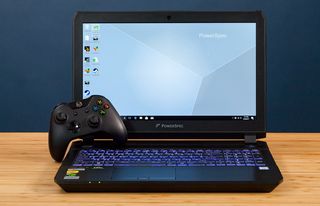
On the back is a vent grill that makes the laptop look a bit like a spaceship. I feel like I've seen it before, and I probably have. The chassis appears to be built by Clevo, which sells its work to other manufacturers. (Specifically, it looks like a model called the P650HS-G.)
The display is surrounded by a massive bezel, with some speaker grills on the deck directly below. The deck is actual aluminum (not just painted to look like it), and the island-style keyboard is sRGB backlit and includes a number pad.
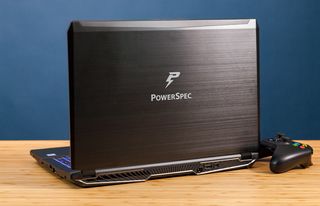
At 6.5 pounds and 1.3 inches thick, the PowerSpec is lighter and thicker than most competitors The Lenovo Legion Y720 is 6.8 pounds and 1.1 inches and the Alienware 15 R3 is 7.4 pounds and 1-inch., However, the MSI GS63VR Stealth Pro is only 4.2 pounds and 0.7 inches thick.
There are so many ports on this thing. I mean, who needs a dock? Let's start on the back where there's a power jack, an HDMI output and a mini DisplayPort. On the left, there's another mini DisplayPort, a pair of USB Type-C jacks and twin USB 3.0 ports. Finally, on the right, there are three audio jacks: headphones, microphone and optical, as well as a SIM card slot, an SD card slot, a USB 3.0, an Ethernet port and a lock slot. Unfortunately, there's no Thunderbolt port.
MORE: Best Holiday Laptop Deals of 2017
Display
The 15.6-inch, 1080p display on the PowerSpec is bright and colorful, which makes it a great choice for gaming or just sitting back and watching a movie. During my testing, I watched the trailer for Avengers: Infinity War, and could see every hair on Peter Parker's arm stand up when his spider-sense went off. And T'Challa's royal robes were a beautifully vibrant purple. Later, when I fired up Middle-earth: Shadow of War, I was impressed by the bright green foliage in a forest level ,and saw the individual cobblestones with moss growing between them on a village street.
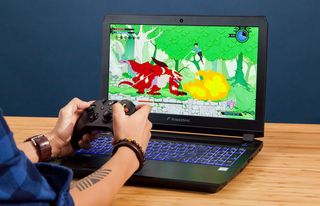
The panel covers an excellent 113 percent of the sRGB color gamut, beating the mainstream average (101 percent) and the Legion Y720 (73 percent). The Alienware scored a single percentage point higher (114 percent). But nothing came close to the Stealth Pro, which reproduced 166 percent of the gamut.
Invest in a decent pair of gaming headphones because the speakers on the PowerSpec are nothing special.
We measured the PowerSpec's screen at an average of 306 nits with our light meter, handily surpassing the average (247 nits), the Legion (210 nits) and the Stealth Pro (242 nits). The Alienware, however, was even brighter (374 nits).
Even better, the screen is a Nvidia G-Sync display, which eliminates screen tearing by adjusting the display to put out only the number of frames that the GPU can produce.
Keyboard and Touchpad
The PowerSpec's keyboard is nothing to write home about, but it's good enough. It has a deep 2.2 millimeters of travel, with the 79 grams of required actuation. But the wrist wrest makes it tiresome to use (it is slightly elevated above the keyboard). Still, on the 10fastfingers.com typing test, I reached 112 words per minute (in my average range), though my error rate hit 3 percent (above my usual 2 percent).
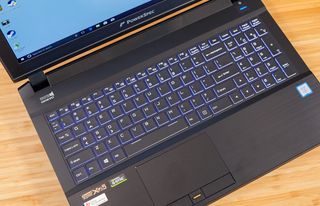
It's sRGB backlit, and you can customize it by section in the included GameFeet software.
The 4.2 x 2.4-inch touchpad is responsive, and I had no issues with gestures like two-finger scrolling or swiping open programs away with three fingers. However, I didn't like the feel of the touchpad, because it was the same material as the rest of the deck. Additionally, there's a fingerprint reader between the two mouse buttons, which I hit incorrectly more times than I care to mention. I wish that was moved to the side (PowerSpec isn't on its own here. We've seen this on other gaming PCs, like those from OriginPC).
Audio
Invest in a decent pair of gaming headphones because the speakers on the PowerSpec are nothing special. They're mounted on the top of the deck and under the chassis, and only barely filled our midsize conference room. When I listened to Ed Sheeran's "Shape of You," the vocals were strong, and I could make out the percussions. But the marimba was on the quiet side, and I only heard it when directly in front of the PC.
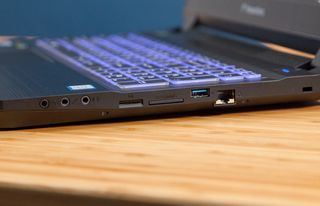
When it came to playing a game, the speakers were too quiet. I could barely hear the orchestral music in Middle-earth: Shadow of War's menus, never mind hearing orcs taunting me during the heat of battle. Though my swords clanking against enemy armor were clear.
I didn't find any audio software on the PowerSpec 1510, even though its 17-inch sibling had some.
MORE: The Best Gaming Laptops
Gaming, Graphics and VR
The PowerSpec 1510 packs an Nvidia GeForce GTX 1070 GPU with 8GB of VRAM. That provides plenty of power for just about any game you want to play on high settings, as well as immersive VR experiences on headsets like an HTC Vive or Oculus Rift. I played Middle-earth: Shadow of War at ultra settings and 1080p, and the game ran between 72 and 81 frames per second (fps) as I fought off orcs, though there were a few hiccups here and there.
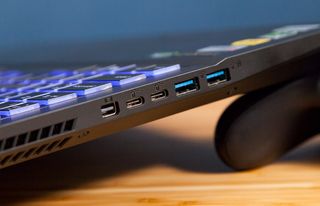
The gaming rig ran Rise of the Tomb Raider (1080p, very high settings) at 56 fps, well beyond the mainstream average of 36 fps, as well as the Legion (35 fps, GTX 1060), the Stealth Pro (48 fps, GTX 1070 Max-Q) and the Alienware (52 fps, GTX 1070).
On Hitman (1080p, ultra), the game ran at a smooth 60 fps, tying the average, though it fell behind the Legion (62 fps), the Stealth Pro (89 fps) and the Alienware (98 fps).
When I watched the trailer for Avengers: Infinity War, I could see every hair on Peter Parker's arm stand up when his spider-sense went off.
The PowerSpec played the Grand Theft Auto V benchmark (1080p, very high) at 60 fps, which was smoother than the average (49 fps) and the Legion (47 fps). But it lagged behind the Stealth Pro (66 fps) and the Alienware (68 fps).
On the SteamVR Performance test, the PowerSpec scored a perfect 11, tying the Alienware and scoring higher than the average (6.4), the Stealth Pro (10.2) and the Legion (6.7).
MORE: 'Keylogger' Found on HP Laptops Not a Serious Threat
Performance
With an Intel Core i7-7700HQ CPU, 16GB of RAM, a 256GB SSD and 1TB hard drive powering it, the PowerSpec can handle everyday activities with ease. Got 30 tabs open in Google Chrome while downloading a game and streaming an episode of The Daily Show with Trevor Noah? Easy-peasy, though you'll probably hear the fans while it happens.
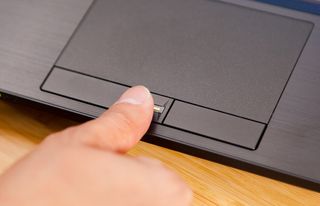
On the Geekbench 4 overall performance test, the PowerSpec earned a score of 14,223, sailing past the mainstream average of 11,015 and beating the Legion (12,169, Core i7-7700HQ) and the Stealth Pro (14,193, Core i7-7700HQ). The Alienware scored slightly higher (14,932) with its overclockableCore i7-7820HK CPU.
With an Intel Core i7-7700HQ CPU, 16GB of RAM, a 256GB SSD and 1TB hard drive powering it, the PowerSpec can handle everyday activities with ease.
The PowerSpec copied 4.97GB of files in 13 seconds, or 391.5MBps. That's not just faster than the average (254.1MBps), but also the Legion (164.2MBps), the Stealth Pro (245MBps) and the Alienware (299.3MBps).
On our OpenOffice spreadsheet macro, the PowerSpec paired 20,000 names and addresses in 3 minutes and 18 seconds, beating the average (4:14), the Legion (5:19) and the Stealth Pro (3:19).The Alienware was a second faster (3:17).
Battery Life
Like many other gaming notebooks, the PowerSpec 1510 should always have its charger nearby. The PowerSpec lasted only 4 hours on the Laptop Mag Battery Test, which browses the web continuously over Wi-Fi at a fixed brightness. The mainstream average is 6:30, the Legion ran for 6:19, the Stealth Pro endured for 3:59 and the Alienware 15 stopped at 3:25.
Heat
For the most part, the PowerSpec stays cool as a cucumber. After streaming 15 minutes of HD video from YouTube, it measured 74 degrees Fahrenheit on the touchpad, 84 degrees between the G and H keys, and 86 degrees on the bottom. To stay this cool, though, the fans run often, even when you're not doing very much.
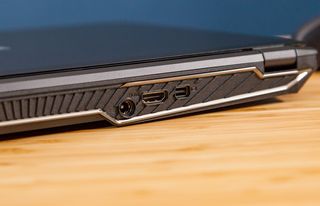
If you're gaming, the computer gets hotter. The touchpad hit 78 degrees when I played Shadow of War, but the keyboard climbed to 109 degrees -- hot enough for me to feel with my fingers on the WASD keys. The bottom reached 113 degrees, and the back, with the vent spewing hot air, hit 128 degrees.
Webcam
The PowerSpec includes a solid 1080p camera that takes sharp photos. You may not even need an external webcam when streaming if you're not a pro. When I took a shot at my desk under challenging fluorescent lights, it still managed to catch individual hairs in my beard and the blue in my eyes.
Software and Warranty
There's not really much software on the PoweSpec. The big app is GameFeet, which is activated with a keyboard shortcut and can be used to customize the keyboard backlighting and set up macros.
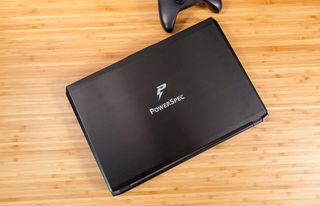
But that's it. Otherwise, there's just a bunch of bloatware from Windows 10, including Plex; Drawboard PDF; Keeper; Candy Crush: Soda Saga; Bubble Witch 3 Saga; and March of Empires: War of Lords.
The PowerSpec 1510 is available exclusively from MicroCenter. The store offers a one-year warranty.
Bottom Line
The PowerSpec 1510 is one of the best gaming deals I've seen in a long time. If you have a MicroCenter nearby, and don't care about having a name-brand PC, $1,300 will take you a long way. It's hard to find a laptop in this price range with a GTX 1070 card.
The biggest drawbacks are the speakers and the warm temperatures while gaming. However, these issues are worth tolerating to get this much performance at such a low price.
If you want something with a brand name (and better speakers), an equivalently specced Alienware 15 is $1,780, and while it's a bit clunkier, you'll get Alienware's useful gaming software and its spaceship-like design.
But if you're looking to save a few hundred bucks, and it's hard to blame you there, the PowerSpec 1510 will serve you well.
Credit: Shaun Lucas/Laptop Mag
PowerSpec 1510 Specs
| Bluetooth | Bluetooth 4.1 |
| Brand | PowerSpec |
| CPU | Intel Core i7-7700HQ CPU |
| Card Slots | SIM, SD memory reader |
| Company Website | powerspec.com |
| Display Size | 15.6 |
| Graphics Card | NVIDIA GeForce GTX 1070 / 8GB |
| Hard Drive Size | 256GB SSD |
| Hard Drive Type | NVMe SSD |
| Highest Available Resolution | 1920 x 1080 |
| Operating System | Windows 10 Home |
| Ports (excluding USB) | Optical audio, Ethernet, USB 3.1, HDMI, USB Type-C, Headphone, Lock Slot, Microphone, Mini DisplayPort |
| RAM | 16GB |
| Secondary Hard Drive Size | 1TB |
| Secondary Hard Drive Speed | 7,200 RPM |
| Secondary Hard Drive Type | HDD |
| Size | 15.3 x 10.8 x 1.3 inches |
| Touchpad Size | 4.2 x 2.4 inches |
| USB Ports | 5 |
| Video Memory | 8GB |
| Warranty/Support | 1 year |
| Weight | 6.5 pounds |
| Wi-Fi | 802.11 a/b/g/n/ac |
| Wi-Fi Model | Intel Dual Band Wireless-AC 8265 |
